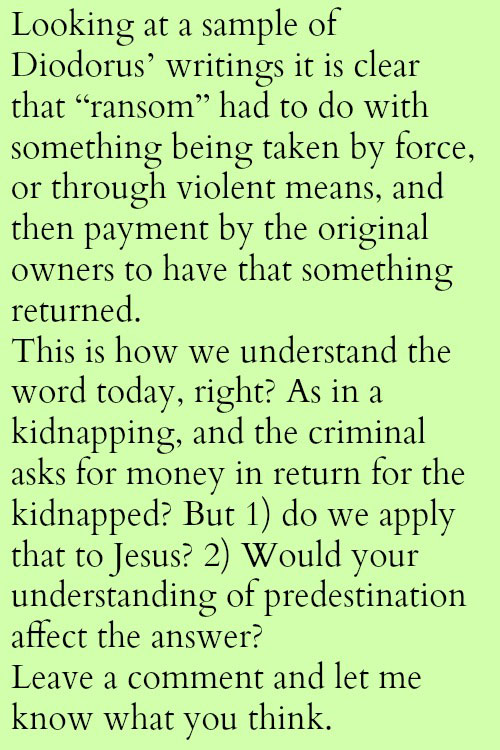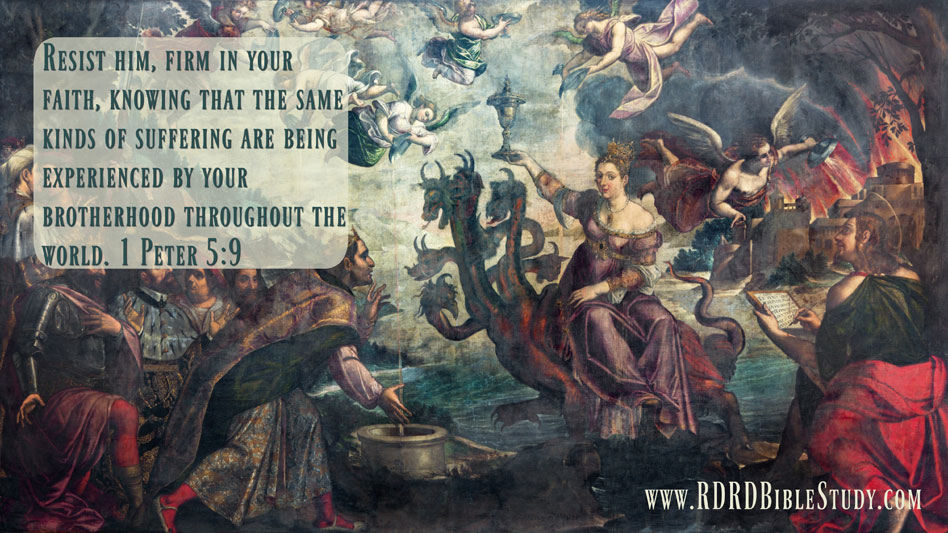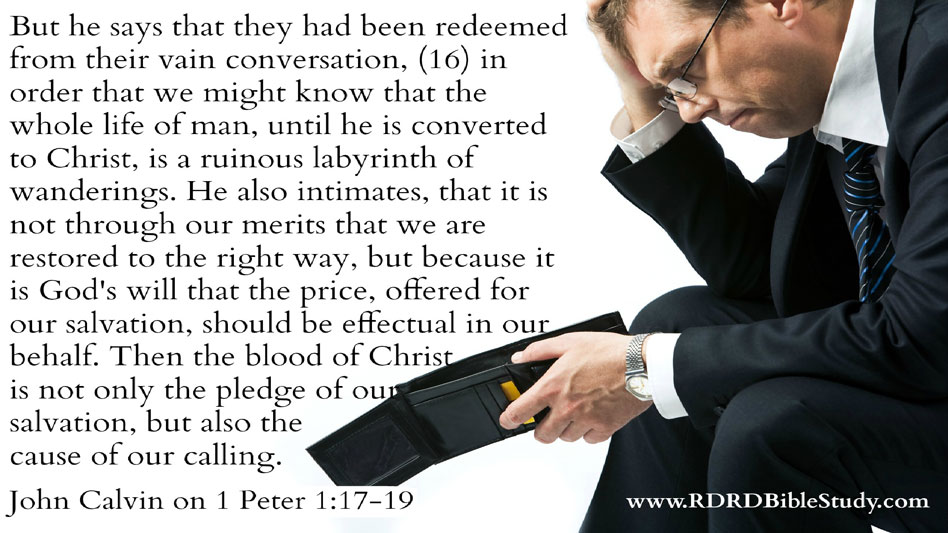The word “ransom” elicits thoughts of kidnappers and hackers. The infamous kidnapping of Patty Hearst in 1974 saturated the news as the kidnappers demanded a ransom in return for Ms. Hearst. Today a digital form of kidnapping known as ransomware plagues individual and organizational users worldwide. After kidnapping data, hackers demand a ransom be paid in return for data to be set free.
The NT word under study comes from a totally different context than Patty Hearst or ransomware hackers. Yet, it is the same general idea, but with a whole lot more at stake.
Word: The Verb “Ransom”
What does Peter mean when he says that Jesus ransomed us with His blood?
Scripture
And if you call on him as Father who judges impartially according to each one’s deeds, conduct yourselves with fear throughout the time of your exile, 18 knowing that you were ransomed from the futile ways inherited from your forefathers, not with perishable things such as silver or gold, 19 but with the precious blood of Christ, like that of a lamb without blemish or spot. (1 Peter 1:17-19)
“Ransomed” is from the Greek verb λυτρόω (pronounced loo-trŏ-oh, emphasis on middle syllable). 1 Peter uses the verb in the passive tense (English voice) in the indicative (statement or question) mood.
“Ransom” in Mark 10:45 is a cognate noun of the verb being studied.
Word Meaning:
- BDAG – “to free by paying a ransom, redeem; to liberate from an oppressive situation, set free, rescue redeem” (BDAG)
- Liddell-Scott – “to release on receipt of ransom, to hold to ransom”
- Thayer – to redeem, liberate by payment of ransom; universally, to liberate; middle [person] to cause to be released to oneself by payment of the ransom, i.e. to redeem, universally, to deliver; in the Jewish theocratic sense, from evils of every kind, external, internal.
- GIND – “free by paying a ransom, redeem”
Verb Parsing
The verb is parsed as an Aorist Passive Indicative 2nd person plural.
- Tense: Aorist, past tense
- Voice: Passive, subject being acted upon
- Mood: Indicative, making an assertion
- 2nd person plural: plural “you”
Peter says to his audience “you were ransomed” the passive voice indicating that “you” the plural subject was acted upon.
Compare Translations of 1 Peter 1-17-19:
ESV – And if you call on him as Father who judges impartially according to each one’s deeds, conduct yourselves with fear throughout the time of your exile, 18 knowing that you were ransomed from the futile ways inherited from your forefathers, not with perishable things such as silver or gold, 19 but with the precious blood of Christ, like that of a lamb without blemish or spot.
KJV – And if ye call on the Father, who without respect of persons judgeth according to every man’s work, pass the time of your sojourning here in fear: 18 Forasmuch as ye know that ye were not redeemed with corruptible things, as silver and gold, from your vain conversation received by tradition from your fathers; 19 But with the precious blood of Christ, as of a lamb without blemish and without spot:
NAS – And if you address as Father the One who impartially judges according to each man’s work, conduct yourselves in fear during the time of your stay upon earth; 18 knowing that you were not redeemed with perishable things like silver or gold from your futile way of life inherited from your forefathers, 19 but with precious blood, as of a lamb unblemished and spotless, the blood of Christ.
NIV – Since you call on a Father who judges each man’s work impartially, live your lives as strangers here in reverent fear. 18 For you know that it was not with perishable things such as silver or gold that you were redeemed from the empty way of life handed down to you from your forefathers, 19 but with the precious blood of Christ, a lamb without blemish or defect.
NRSV – If you invoke as Father the one who judges all people impartially according to their deeds, live in reverent fear during the time of your exile. 18 You know that you were ransomed from the futile ways inherited from your ancestors, not with perishable things like silver or gold, 19 but with the precious blood of Christ, like that of a lamb without defect or blemish.
NLT – And remember that the heavenly Father to whom you pray has no favorites. He will judge or reward you according to what you do. So you must live in reverent fear of him during your time as “foreigners in the land.” 18 For you know that God paid a ransom to save you from the empty life you inherited from your ancestors. And the ransom he paid was not mere gold or silver. 19 It was the precious blood of Christ, the sinless, spotless Lamb of God.
The Message – You call out to God for help and he helps—he’s a good Father that way. But don’t forget, he’s also a responsible Father, and won’t let you get by with sloppy living. 18-19 Your life is a journey you must travel with a deep consciousness of God. It cost God plenty to get you out of that dead-end, empty-headed life you grew up in. He paid with Christ’s sacred blood, you know. He died like an unblemished, sacrificial lamb.
Any Big Differences?
With the exception of the NLT’s free translation and The Message’s paraphrase, no glaring differences exist between the major translations of the Bible. The NAS, KJV, and NIV all rendered the word closer to the English equivalent of “redeem.”
NLT Difference
Recall Peter’s use of the verb is parsed as an Aorist Passive Indicative 2nd person plural, asserting to his audience that “you were ransomed” the passive voice indicating that “you” the plural subject was acted upon.
Note that the NLT freely translated this as a first person active though that is not what the Greek word actually translates; God, as the subject is doing the action, “God paid a ransom.” It is, in essence, saying the same thing. In order to preserve Peter’s personalization of the subject being acted upon “you were ransomed”, the NLT also adds the infinitival phrase “to save you.”
- NLT: God paid a ransom + to save you
- ESV: You were ransomed (which includes the idea of salvation)
Range of Meaning
The range of meaning for the verb “ransom” is included in Word Meaning above.
Does Peter Use This Word Anywhere Else?
No.
Is This Word Used Anywhere Else in the NT?
Yes. The verb is used in two other places in the NT.
Luke 24:21 But we had hoped that he was the one to redeem Israel. Yes, and besides all this, it is now the third day since these things happened.
parsing: “Redeem” is a present middle infinitive used to express the purpose for their hope.
Titus 2:14 who gave himself for us to redeem us from all lawlessness and to purify for himself a people for his own possession who are zealous for good works.
parsing: “Redeem” is an aorist middle subjunctive 3rd person singular; Paul is also expressing a purpose statement but using a subjunctive (as opposed to Luke’s infinitive); used because intention or purpose is only a desired result, not necessarily an actual one.
Cognates
Cognates are words from the same original word or root. Textures and layers conveyed by the meaning and use of cognates can provide a more insightful analysis of the word. Though it does not alter the meaning of the original study word, it does expand understanding of it (in multiple ways; not all situations are the same). Resist any temptation to force a cognate’s meaning to the word under study.
The Greek verb λυτρόω has the following cognate nouns:
| NOUN | TRANSLITERATION |
| λύτρον | lutron |
| λύτρωσις | lutrōsis |
| λυτρωτής | lutrōtās |
Notice that each of the words derive from the same root lutro-.
Cognates’ Meaning and Examples of Scripture Use
- λύτρον – price of release, ransom
Matthew 20:28 even as the Son of Mas an came not to be served but to serve, and to give his life as a ransom for many.
Mark 10:45 For even the Son of Man came not to be served but to serve, and to give his life as a ransom for many.
This word is well attested in many writings around the 1st century. Here are some examples from Greek historian Diodorus Siculus who wrote the monumental Bibliotheca historica, Historical Library, between 60 and 30 B.C.5:17:3 The Baliares are of all men the most fond of women and value them so highly above everything else that, when any of their women are seized by visiting pirates and carried off, they will give as ransom for a single woman three and even four men.
19:73:10 He also came suddenly upon the forces of Pausanias, catching them after they had taken refuge in a place difficult of access. This he captured; and, after slaying Pausanias, he dismissed some of the soldiers on receiving ransom and enrolled others in his own army.
19:85:3 Ptolemy and Seleucus permitted the recovery of the dead, and they returned to Demetrius without ransom the royal baggage, which had been captured, and those of the prisoners who had been accustomed to be in attendance at the court.
- λύτρωσις – being liberated from an oppressive situation; transferred sense of commercial usage “redemption of something for a price;” ransoming, releasing, redemption
Luke 1:68 Blessed be the Lord God of Israel, for he has visited and redeemed his people
Luke 2:38 And coming up at that very hour she began to give thanks to God and to speak of him to all who were waiting for the redemption of Jerusalem.
Hebrews 9:12 he entered once for all into the holy places, not by means of the blood of goats and calves but by means of his own blood, thus securing an eternal redemption.
- λυτρωτής – redeemer
Acts 7:35 “This Moses, whom they rejected, saying, ‘Who made you a ruler and a judge?’ – this man God sent as both ruler and redeemer by the hand of the angel who appeared to him in the bush.
The Septuagint
The third cognate which refers to a person as a “redeemer” or “ransomer” is used in the Psalms to refer to God:
Psalm 9:14 Let the words of my mouth and the meditation of my heart be acceptable in your sight, O LORD, my rock and my redeemer.
Psalm 78:35 They remembered that God was their rock, the Most High God their redeemer.
Note About Doing Word Studies
In the normal course of bible study, a word is not studied in isolation. Most likely additional word studies will be needed to fully interpret the meaning of a passage. The purpose of this post is to do a word study on the verb “ransom.”
Therefore, the purpose of the upcoming section is to provide an example of how studying the Greek word translated “you were ransomed” helps to interpret, and subsequently to understand, what Peter wants his audience to hear.
Though lots more could be studied and researched and said, the following will use the prior word study of the verb “ransom” and how the information gathered adds to the overall understanding of this passage.
And Another Note…
all of this is before looking at a commentary.
How Does This Help In Understanding the Use of “Ransom” in 1 Peter 1:17-19?
Historical Context
Peter is writing to the early church, specifically the churches in Asia Minor (1:1)—to Pontus, Galatia, Cappadocia, Asia, Bithynia—all part of the Roman Empire. The time period is necessarily after the stoning of Stephen, i.e. Christian persecution in Judea, and after or during the time of Paul’s missionary journeys.
The believers are undergoing suffering, experiencing hostility from the communities and societies in which they live. Some of the persecution is most likely physical (4:12) and definitely verbal (reviled 3:9; slandered 3:16; maligned 4:4; denounced as criminals 2:12, 14; 4:15) in the form of societal pressure against the Christian community.
Photo of the painting of Apocalyptic vision by Grazio Cossali mid-16th century. The courtesan Babylon sitting on the dragon. Located in the church Chiesa di San Giovanni Evangelista Brescia, Italy
Peter writes to encourage believers to live out their faith in spite of suffering whether it be marginalization by society, insults, false accusations, etc. In fact, live it so well that perhaps some of these slanderers, etc., will come to know Christ.
Literary Context
First century letter.
1 Peter Chapter 1 Context
Peter stresses the concepts of eternal and imperishable, joy and salvation. By linking God the Father and Christ, he sets the doctrine of incarnation as the firm foundation upon which the eternal and imperishable blood of Christ brings salvation and joy to believers.
Throughout the chapter Peter contrasts perishable and imperishable. Emphasis is placed on the fact that believers have not been ransomed with something perishable—like silver and gold which was no doubt greatly valued by society. But with something imperishable—“sprinkling with His blood” (v.2). Because of Christ’s death and resurrection, believers are born again to a living hope through the resurrection of Jesus Christ from the dead, to an inheritance that is imperishable, undefiled, and unfading (vv. 3-4); born again with imperishable seed through the living and abiding word of God (v. 23)—which never passes away, it is eternal. The Word of the Lord is forever! And this Word is the Good News of Jesus Christ (v.25).
In turn, the readers’ faith is more precious than gold which perishes in fire (v. 7). Faith in Christ is imperishable, it does not perish in the fire, a double meaning indicating the judgment of God on unbelievers. Because of the costly nature of the ransom, believers are assured of their salvation which will be revealed at the revelation of Jesus Christ.
And though suffering hostility from the surrounding society, they are guarded by God’s power through faith for salvation (1:5). This is the same salvation that OT prophets prophesied about and longed to look into (1:10-12). These people who have left a pagan way of life and put their faith in Christ are now part of God’s age old plan of salvation. As a matter of fact, they also have a significant purpose in God’s plan of salvation.
Knowing all of this, believers are to prepare their minds for action and look forward to the grace at the revelation of Jesus Christ (1:13). These actions done in faith and hope include but are not limited to: resist succumbing to pressure and returning to old ways of life (1:14); being holy as God is holy (1:15); conducting themselves in reverential fear (1:17); and loving one another earnestly from a pure heart (1:22). As the letter continues, Peter makes clear the significance of their holy living during these trying times in which they live—to live as witnesses to the grace of Jesus Christ in this hostile world for themselves and the surrounding society.
Scripture – 1 Peter 1:17-19
1 Peter 1:17-19 begins “and if you call on Him…” In other words, the grace of being “ransomed from futile ways by the precious blood of Christ” applies to believers. (But notice how the “if you” opens the door of salvation to all; though some would argue God’s determinative foreknowledge intends “if you” to the elect and Peter certainly has a healthy theology of election; either way, Peter is talking to believers).
Amid the hostility of the world—suffering, the insults, slander, name-calling, social pressure, physical persecution—conduct yourselves with fear. A study of the verb conduct as in “conduct yourselves” reveals that Peter uses its cognate noun in 1:15, 2:12, 3:1 and 3:2, indicating the importance of Christian “conduct” in the letter.
Believers, having faith in the holiness and justice of the Father, should continue in holy behavior while still on earth—while still in the perishable realm. As pointed out earlier, God’s justice applies equally to all. There is no favoritism, even for the people of God. And certainly there is no favoritism for unbelievers who are persecuting God’s people.
Peter exhorts his audience to remain steadfast in this hostile environment, all the while knowing they have been
- Rescued from an oppressive situation of which there was no escape
- Freed from sin, Satan, and death by the death and resurrection of Christ Jesus
- Redeemed by Jesus Himself, God incarnate, who traded His life for believers, taking their death and their sins upon Himself
And these acts—rescued, freed, redeemed—weren’t purchased with silver and gold. Precious metals may be valuable in the temporal realm in which the people now live. But they have no eternal value at all.
Against these signs of worldly wealth, Peter stresses the costliness of this ransom—Christ’s death—on behalf of his audience. Sin is a curse on creation. Its atonement required the precious, eternal, i.e. imperishable, blood of Jesus Christ. Blood indicates a death has occurred. The hopelessness of the human dilemma has been redeemed by Christ’s death. By faith in what Christ’s death has accomplished, a person is set free.
Because believers can be assured of their salvation by the grace of such a costly gift, they are to conduct themselves in reverential fear of God while on earth. That is until their salvation is revealed in the last time at the revelation of Jesus Christ. At this time also, believers will witness the Father’s impartial judgment according to one’s deeds whether those deeds are living in fear of God or abusing the people of God.
Passages With Similar Themes In the NT
Already we have discussed how Peter uses the themes of incarnation and eternity to encourage the early church to rejoice in their salvation. In addition to incarnation and eternity in the following passage, note how 1) God acts on behalf of His people, 2) Jesus is the One who secures eternity, and 3) the manna was perishable, that is, not life-sustaining, but the bread that comes from heaven is imperishable.
It is written in the Prophets, ‘And they will all be taught by God.’ Everyone who has heard and learned from the Father comes to me- 46 not that anyone has seen the Father except him who is from God; he has seen the Father. 47 Truly, truly, I say to you, whoever believes has eternal life. 48 I am the bread of life. 49 Your fathers ate the manna in the wilderness, and they died. 50 This is the bread that comes down from heaven, so that one may eat of it and not die. 51 I am the living bread that came down from heaven. If anyone eats of this bread, he will live forever. And the bread that I will give for the life of the world is my flesh.” John 6:45-51
Ransom And Redeem In The OT
The concept of “ransom” is found explicitly in the Mosaic Law. This helps in understanding the spiritual meaning of “you were ransomed…” The following are sample uses of the verb:
Exodus 13:13 Every firstborn of a donkey you shall redeem with a lamb, or if you will not redeem it you shall break its neck. Every firstborn of man among your sons you shall redeem.
Exodus 34:20 The firstborn of a donkey you shall redeem with a lamb, or if you will not redeem it you shall break its neck. All the firstborn of your sons you shall redeem. And none shall appear before me empty-handed.
Here is another example of the concept of “ransom” in the Law, but here a cognate noun is used:
Numbers 35:31 Moreover, you shall accept no ransom for the life of a murderer, who is guilty of death, but he shall be put to death.
In the following passages, Psalm 49:7-8 uses a cognate noun of our verb “ransom” while 49:15 uses the verb. Note the same concepts of “truly no man can ransom,” “costly and never suffice,” “from the power of Sheol,” and “God will ransom…” all for salvation, as in 1 Peter.
Psalm 49:7-9 Truly no man can ransom another, or give to God the price of his life, 8 for the ransom of their life is costly and can never suffice, 9 that he should live on forever and never see the pit.
Psalm 49:15 But God will ransom my soul from the power of Sheol, for he will receive me. Selah.
Hosea prophesying the word of God to the Northern Kingdom of Israel:
Hosea 13:14 Shall I ransom them from the power of Sheol? Shall I redeem them from Death? O Death, where are your plagues? O Sheol, where is your sting? Compassion is hidden from my eyes.
God promised to redeem Israel from Egypt (Gen. 50:24-25). God appointed Moses as leader of this great redemption. Before entering the Promised Land, Moses told the people that God would send another prophet like him (Deut. 18:14)—another man sent from God to lead a great redemption. Moses serves as a type of Christ.
In the following verse, God is instructing Moses to tell the people that He Himself will redeem/ransom them from “under the burdens of Egypt” (type for burdens of sin):
Exodus 6:6 Say therefore to the people of Israel, ‘I am the LORD, and I will bring you out from under the burdens of the Egyptians, and I will deliver you from slavery to them, and I will redeem you with an outstretched arm and with great acts of judgment.
The Last Things – Commentaries
From John Calvin’s commentary on 1 Peter.
Up until now, I have not consulted any commentaries. Prayer and study, guided by the Holy Spirit, has led thus far without the distraction of preconceived notions.
Consulting commentaries at the end of study is beneficial in confirming exegetical analysis. As the case may be, commentaries may also help in redirecting misguided analysis. If an interpretation is completely different from what is found in the commentaries, analysis should be double checked.
I. Howard Marshall, 1 Peter in The IVP New Testament Commentary Series
God is the One who judges everybody according to their works and who does so quite impartially, without favoring one or another. Christians are people who pray for help from this God as their Father (1:2). The prayer that Jesus taught His disciples and that was used in the early church addresses God by this name (Lk. 11:2; compare Rom 8:15; Gal 4:6; Eph 3:14). But those who address God in this way must remember who He is. As Father He does not cease to be judge. Christians are not in a position where it doesn’t matter how they live because they believe in Christ and all will be forgiven at the last judgment. On the contrary, they should live in this world, filled with its temptations, with reverence for God in the face of His judgment.
Peter fleshes out what this attitude involves. If he talked about God as the Father who should be reverenced because He judges His people, Peter now introduces a deeper motive for Christian conduct in the fact of redemption. The picture is of people who were in bondage but have now been set free. The concept of redemption in the ancient world applied to a variety of contexts, including the emancipation of slaves from their masters and the release of prisoners of war. In the Old Testament the picture was used to describe how God set His people free from bondage in Egypt and brought them out to live in freedom in the Promised Land. Later the return of the exiles from Babylon was depicted in similar terms (Is. 52:3). Redemption generally takes place by the payment of a ransom.
Peter uses the picture here to make a number of points:
- The former state of the readers was one of bondage—bondage to a particular way of life inherited from their ancestors. For the Romans, ancestral traditions were praiseworthy, but not so for Peter. The way of life described in 1:14 and 4:2 was dictated by evil desires and belonged to the time when the readers were ignorant of God and His will. It stands in contrast to the new, holy way of life that is now expected of them (1:15). The old way of life is characterized as empty; lacking in purpose and leading to no good results (compare (Eph. 4:17).
- Redemption from bondage was possible only by the payment of a ransom price. Peter wants to emphasize the great cost involved, so he points out that the ransom was not paid with precious metals like silver and gold, which despite their durability are not of lasting worth, but rather with the blood of Christ, which is genuinely costly. He contrasts material wealth and a person’s life, and the contrast is enhanced because it was the lifeblood of Christ that was spilled.
The way in which Peter frames the thought makes it clear that the reminder is not so much of the redemption itself but rather of the cost of the redemption. Christians can easily take their redemption for granted. The way to avoid this attitude is by remembering its infinite cost.
- The reference to blood indicates that Christ’s was not just an ordinary death but rather a sacrificial death. Peter develops this important idea by comparing Christ’s blood to the blood of a sacrificial animal that was unblemished as the Law required. Only top quality animals were acceptable to God. The language suggests that Peter has the lamb sacrificed in the Passover ritual in mind. Whatever the original significance of the ritual, by New Testament times the Passover sacrifice had come to be regarded as a means of atonement for sin.
Peter is saying that the readers were caught with no possibility of escape, in a futile way of life that would end in condemnation from the Judge who judges everybody according to their works. Christ’s self-offering to God as a sacrifice, however, constituted the ransom price by which they were set free from the old way of life and brought into the new life of the children of God. Christ’s death as a sacrifice for sin set them free from the prospect of condemnation and enabled them to escape from the downward path.
[begin comments on v. 20] Although his point has been adequately made, Peter goes further. He links the sacrificial death of Jesus with the plan of God. The coming of Christ took place in accordance with a divine plan, which was made even before the creation of the world…
Conclusion
In doing this word study, the study word, the verb “ransom” found in 1 Peter 1:18, was the consistent focus throughout. Also it was studied within the context of 1 Peter 1:17-19 and the larger contexts of 1 Peter 1, 1 Peter, the NT, and the OT. So much more could be done, but as stated earlier, this post is not to exhaust the subject of “ransom/redeem” in the Bible, but rather to give a practical example of doing a word study. Feel free to copy the page and use the headings for a template.
Until Next Time—
The grace of the Lord Jesus Christ and the love of God and the fellowship of the Holy Spirit be with you all. 2 Corinthians 13:14
Greek Resources accessed from BibleWorks© Software:
BDAG – Greek-English Lexicon of the New Testament and Other Early Christian Literature, Third Edition. Revised and edited by Frederick William Danker. The University of Chicago Press 2000.
GIND – Shorter Lexicon of the Greek New Testament, 2nd Edition, edited by F. Wilbur Gingrich and Frederick William Danker. The University of Chicago Press 1965.
Liddell-Scott – A Greek-English Lexicon, 9th Revised Edition, by Henry George Liddell, Robert Scott, Henry Stuart Jones, and Robert McKenzie. Oxford University Press 1996.
Thayer – A Greek-English Lexicon of the New Testament, translated, revised, and enlarged by Joseph Henry Thayer, D. D. 1889. International Bible Translators, 1998-2000.
Other Resources:
I. Howard Marshall, 1 Peter. The IVP New Testament Commentary Series. (Downers Grove: InterVarsity, 1991), 53-56.













